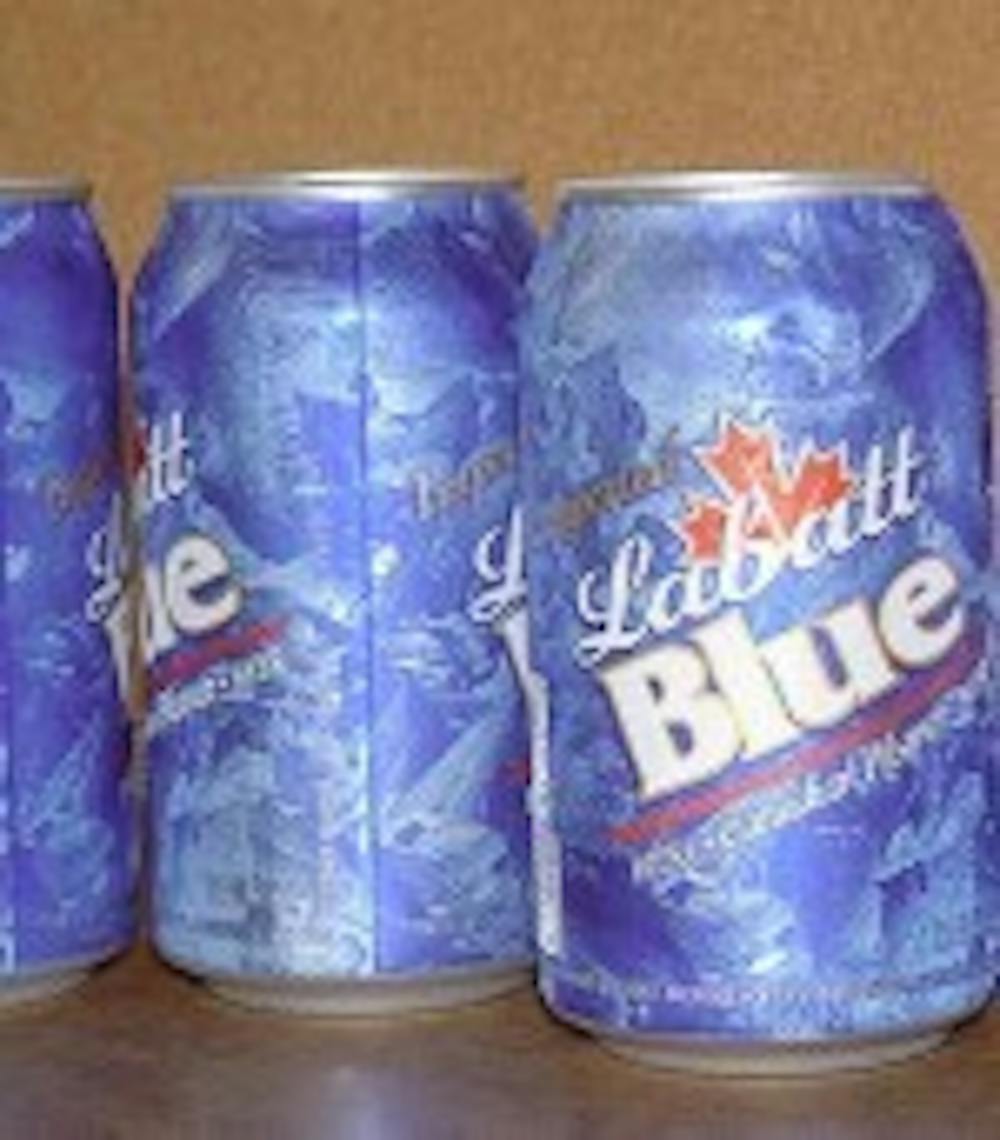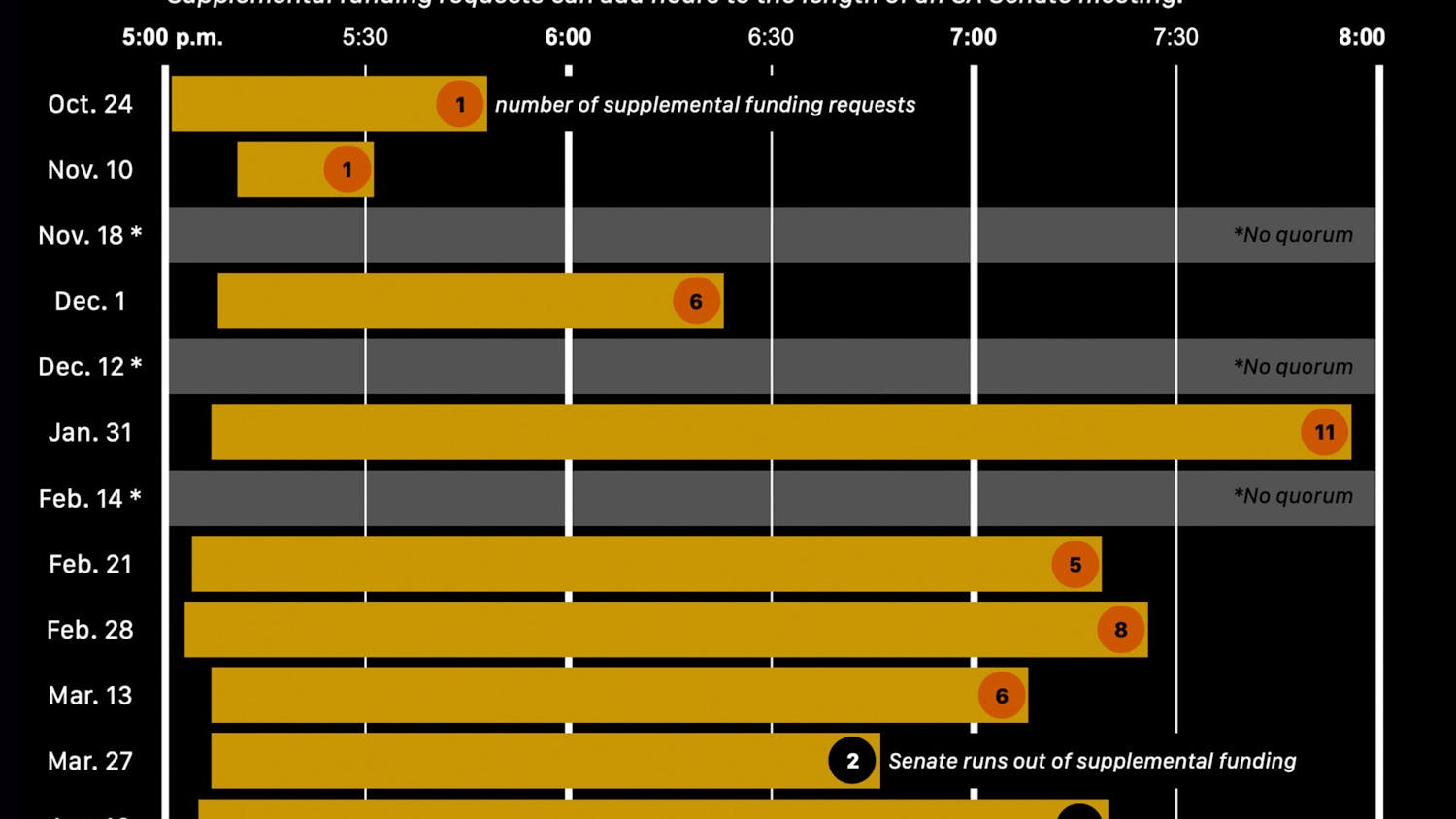What UB lacks in professors, administration and student enthusiasm, it more than makes up for in beer, marijuana, hard liquor and Greek life - at least, that's what the Princeton Review's "The Best 345 Colleges" book indicates.
The book, which hit newsstands and the Internet on Aug. 20, ranked UB No. 6 on its list of the nation's Top 20 "party schools." In addition, UB was ranked No. 2 for both beer and hard liquor consumption, No. 7 for "reefer madness" (marijuana usage) and No. 13 for "major frat and sorority scene."
"The parties that I go to are very rare," said Maya Gourdine, a senior nursing major. "But I guess if you base (the ranking) on the bars on Main Street . then you're correct. People here go out Tuesday through Sunday."
Jason Terrell, a senior communication major, seemed disappointed with UB's ranking as the No. 6 party school.
"We need to be number one," said Terrell. "We need to party like the athletes do."
UB fared much worse in terms of academics, landing No. 15 for "class discussions are rare" and "TAs teach too many upper level courses," as well as No. 20 for "professors suck all life from the material" and "long lines and red tape," and No. 13 for "least happy students."
The 345 colleges were ranked on 63 different lists based on a 70-question survey taken by 100,000 students, an average of 300 per school, said Erik Olson, editor of the book.
The questions could be answered on a five-point scale - five being "strongly agree" and one being "strongly disagree." If the number of students who "strongly agreed" equaled the number of students who "strongly disagreed" on a particular area being surveyed, the college would not appear on that list.
Dennis Black, vice president of Student Affairs, quickly discredited the rankings, which he believes "shouldn't be taken seriously."
Student Association President Christian Oliver agreed, saying the rankings were "more or a less a sham."
"There is no credibility to the Princeton Review whatsoever," said Oliver.
Black is concerned about how the rankings will affect perceptions of the university.
"I think our interests here are prospective students and prospective parents," said Black. "We don't want students to choose Buffalo because of these kinds of lists, and we don't want students to stay away from Buffalo because of these kinds of lists."
Although Barrington Gordon, a freshman business management major, came to UB because of the School of Management's reputation and the fact that his brother resides in Buffalo, he said he knew of UB as a party school and frequently "came all the way from Brooklyn" to party before he was enrolled.
"I've been to a few (parties) since I came here and school only started today," said Gordon. "I think we're actually No. 1 but (the Princeton Review) doesn't want to give us the title yet."
Black said UB regularly conducts studies on alcohol and drug use among the student body through the orientation program and the Health and Wellness Center. All the studies thus far indicate that UB students are "normal" in comparison with the drug and alcohol use of other schools.
Noting that less than 1,000 UB students are involved in Greek organizations, a number that has been on the decline in recent years, Black said that UB's No. 13 "major frat and sorority scene" ranking is a testament to the Princeton Review's inaccuracy.
"I don't care how you slice or dice that one, it just isn't true," said Black. "I could probably name, in one sitting, 250 schools that have a larger and more defined fraternity and sorority program than we do."
Steven Goodemote, a junior management and information systems major, was surprised UB was rate No. 13. "People who are in (Greek organizations) are all for it and people who aren't, don't care about it," he said.
Oliver said that UB's Greek life is "large" but "underground," where it is less noticeable as a part of regular campus life.
Olson said the surveys were not unlike studies conducted by Consumer Reports to reflect product satisfaction. Despite the fact that 300 students is less than two percent of UB's total student body, Olson defended the surveys, saying that many respected surveys poll a relatively small sample.
"Mostly, when a school's on a great list we hear great things from them; they love us," said Olson. "When they end up on less favorable lists, they either attack our publication or our methodology when compiling the rankings."
The Princeton Review's "345 Best Colleges" has also come under fire from the American Medical Association for even having a "party school" list.
According to Don Zeigler, deputy director of AMA's "A Matter of Degree," a binge-drinking prevention program, the party school list "glamorizes alcohol, legitimizes dangerous behavior on campuses and gives a false notion that alcohol is central to the college experience."
Zeigler says the lists like these encourage high-risk behavior.
Richard Yoast, director of AMA's Office of Alcohol Policy, sent a letter to John Katzman, Princeton Review's chief executive officer, requesting that the party list be removed from this year's edition, said Zeigler.
Katzman denied the request, said Ziegler, on the grounds that he believed the book did not promote binge-drinking, but he asked if the AMA would be interested in co-sponsoring a study on college students' drinking habits.
"We're not going to get into that game," said Ziegler. "We think (the Princeton Review) should just stop what they're doing."
Olson feels the party list should be included because students should have as much access to information about their prospective colleges as possible.
"College is a huge investment, not just of your money," he said. "You're also going to spend four years of your life at this particular campus, and our hope is that our readers will be able to use this guide as a resource for finding the best college for them."
Ziegler believes the only reason the Princeton Review keeps the party school list in its college guidebook is because it generates a buzz and sells more copies.
"We've criticized the Princeton Review . but in effect, we've given them tremendous publicity," he said. "Everybody knows the Princeton Review just came out because of this. That's a risk we take, but we want to get the message across that this is a serious health issue and social issue."
Olson said the party school listing is an important part of the book because parties are a part of student life. To remove the listing would "detract from the inclusive nature of the guidebook."
"Physics 101 at Indiana University is not so different from Physics 101 at Brigham Young University," said Olson. "It is different as to how their students spend their nights and weekends."
Ziegler said that the titles of the lists, such as "stone cold sober schools" and "got milk?" mocked colleges that surveyed low alcohol and marijuana usage, while list titles such as "reefer madness," "lots of beer" and "lots of hard alcohol," implies that schools with high alcohol and marijuana usage are "fun schools."
"Certain students may look at (the party school) list and say 'wow, I want to have a blast. I want to have an education, but I don't want to have to study much, and I want to have a good time, let me go to those schools,'" he said. "It might become a self-fulfilling prophecy."
Gourdine agreed. "My freshman year I wanted to go to a party school because I through that was more fun," she said. "If you didn't go to a party school, your school was whack."
Despite the fact that some colleges and universities may receive rankings they are not pleased with, Olson said that being included in the book is a privilege.
"The schools that end up in this book are the cr?(c)me de la cr?(c)me. They are in the top 10 percent of institutions of higher learning in this country," said Olson. "There's over 3000 (colleges in the nation), so for a school to be included in the first place is a great honor."
Black, however, said whatever ratings received by the Princeton Review would not be taken to heart, whether positive or negative.
"Should I be proud of the fact that (last year) we had 'dorms like dungeons' and this year we don't? I'm not celebrating that . because the fact is, I don't think what (the Princeton Review) said last year made a heck of a lot of sense and I can't say I think what they said this year makes a lot of sense."





